-
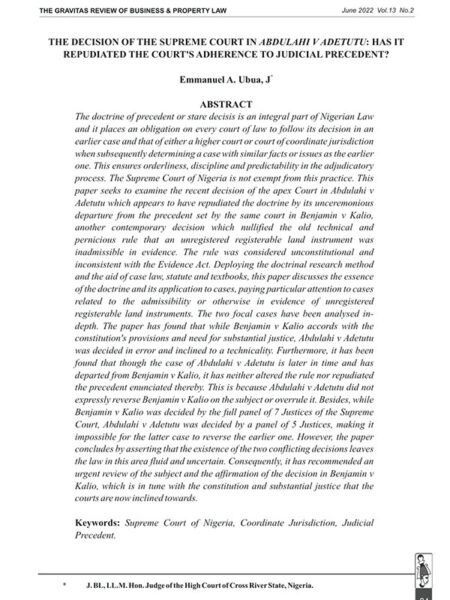
The Decision of The Supreme Court in Abdulahi v Adetutu: Has it Repudiated the Court’s Adherence to Judicial Precedent?
0₦2,500.00Honourable Justice Emmanuel Ubua of the High Court of Cross River State, in his article, The Decision of The Supreme Court in Abdulahi v Adetutu: Has it Repudiated the Court’s Adherence to Judicial Precedent? examines the decision of the Supreme Court in Abdulahi v Adetutu which appears to have repudiated the doctrine of stare decisis by its unceremonious departure from the precedent set by the same court in Benjamin v Kalio. The Supreme Court in Kalio nullified the old technical and pernicious rule that an unregistered registerable land instrument was inadmissible in evidence. The rule was considered unconstitutional and inconsistent with the Evidence Act. However, in the case of Abdulahi v Adetutu which was decided later, the Supreme Court seems to have somersaulted when it held that an unregistered instrument was inadmissible in evidence for breaching provisions of the Land Instruments Registration Law. Hon Justice Ubua comprehensively reviews the cases of Kalio and Adetutu and posits that while Kalio accords with constitutional provisions and the need for substantial justice, Adetutu was decided in error and inclined to technicality. Hon Justice Ubua recommends an urgent affirmation of the decision in Kalio, which is in tune with the constitution and substantial justice.
-
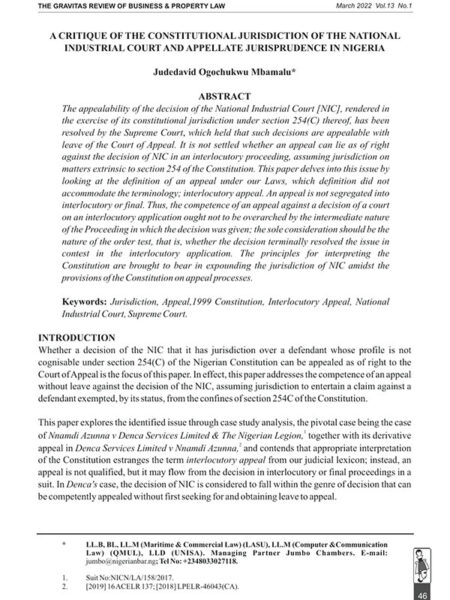
A Critique of the Constitutional Jurisdiction of the National Industrial Court and Appellate Jurisprudence in Nigeria
0₦2,500.00Dr Judedavid Mbamalu, Managing Partner of Jumbo Chambers, in his paper, A Critique of the Constitutional Jurisdiction of the National Industrial Court and Appellate Jurisprudence in Nigeria, argues that while the appealability of the decision of the National Industrial Court (NIC), rendered in the exercise of its jurisdiction under section 254(C) of the 1999 Constitution of Nigeria has been resolved by the Supreme Court, it is not settled whether an appeal can lie as of right against the decision of the NIC in an interlocutory proceeding, assuming jurisdiction on matters extrinsic to section 254. Dr Mbamalu argues that the segregation of appeals into ‘interlocutory’ and ‘final’ is unknown to ‘our Statutes and Rules of Court’, and the competence of an appeal against a decision of a court on an interlocutory application ought not to be overarched by the intermediate nature of the Proceeding in which the decision was given. He elaborates on the principles for interpreting the Constitution in expounding the jurisdiction of the NIC amidst the provisions of the Constitution on appeal processes.
-
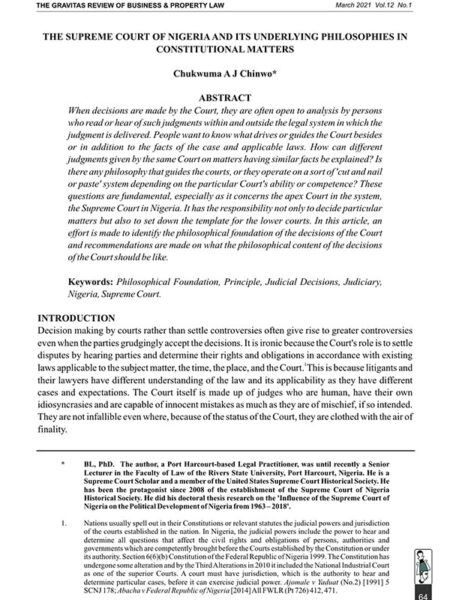
The Supreme Court of Nigeria and its Underlying Philosophies in Constitutional Matters
0₦2,500.00Dr Chukwuma Chinwo, formerly Senior Lecturer at the Rivers State University, and now a Port Harcourt-based Legal Practitioner in his article, The Supreme Court of Nigeria and its Underlying Philosophies in Constitutional Matters, asks a question that bothers many: How can the same Court give different judgments on matters having similar facts? Dr Chinwo examines the Supreme Court of Nigeria’s judicial philosophy. From an extensive review of several Supreme Court decisions, he weaves a coherent thread of factors that influence the Court’s judgments.
-
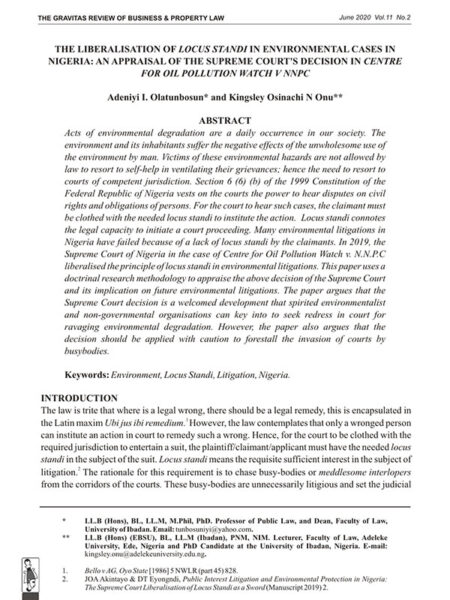
The Liberalisation of Locus Standi in Environmental Cases in Nigeria: An Appraisal of the Supreme Court’s Decision in Centre for Oil Pollution Watch v NNPC
0₦2,500.00Adeniyi Olatunbosun, Professor of Public Law, and Dean Faculty of Law, University of Ibadan, Nigeria and Kingsley Onu, Lecturer Adeleke University Ede Nigeria in their article, The Liberalisation of Locus Standi in Environmental Cases in Nigeria: An Appraisal of the Supreme Court’s Decision in Centre for Oil Pollution Watch v NNPC, comprehensively examine the concept of locus standi in environmental cases. They review the decision of the Supreme Court in COPW V NNPC regarding the locus standi of a non-governmental organisation to sue for an act of environmental degradation. They conclude with an analysis of the effect of the Supreme Court’s decision on future of environmental litigations in Nigeria.
-
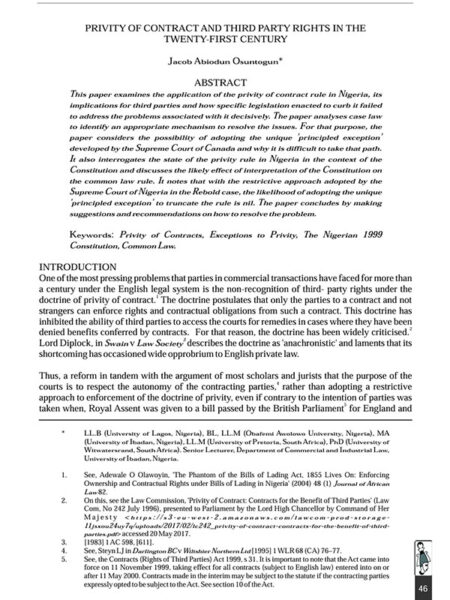
Privity of Contract and Third Party Rights in the Twenty-First Century
0₦2,500.00Dr Jacob Osuntogun of the University of Ibadan in, Privity of Contract and Third-Party Rights in the Twenty-First Century, examines the application of the doctrine of Privity of Contract in Nigeria, and its implications for third parties. He analyses Nigerian cases on the doctrine including the Supreme Court decision in Rebold v Magreola; various exceptions to the Privity rule and how specific legislation enacted to address the inadequacy of the rule have fared. He interrogates the possibility of adopting the unique ‘principled exception’ rule developed by the Supreme Court of Canada and advocates the enactment of comprehensive legislation to address the shortcomings of the doctrine.
-
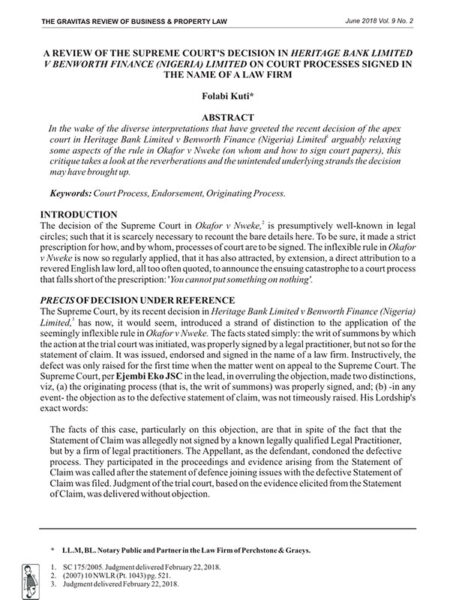
A Review of the Supreme Court’s Decision in Heritage Bank Limited v Benworth Finance (Nig) Ltd on Court Processes Signed in the Name of a Law Firm
0₦2,500.00Folabi Kuti, Partner Perchstone & Graeys, in A Review of The Supreme Court’s Decision in Heritage Bank Limited v Benworth Finance (Nigeria) Limited On Court Processes Signed in the Name of a Law Firm, contemplates the diverse interpretations that have greeted the recent decision of the apex court in the cited case arguably relaxing some aspects of the rule in Okafor v Nweke. Folabi takes a critical look at the reverberations and the unintended underlying strands the decision may have brought up.
-
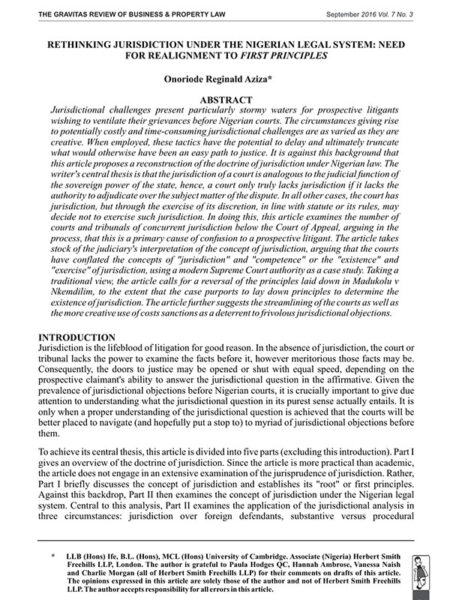
Rethinking Jurisdiction under the Nigerian Legal System: Need for Realignment to First Principles
0₦2,500.00Onoriode Aziza, Associate (Nigeria) at Herbert Smith Freehills LLP, London in “Rethinking Jurisdiction under the Nigerian Legal System: Need for Realignment to First Principles” argues that the jurisdiction of a court is analogous to the judicial function of the sovereign power of the state, hence, a court only truly lacks jurisdiction if it lacks the authority to adjudicate over the subject-matter of the dispute. In all other cases, the court has jurisdiction, but through the exercise of its discretion, in line with statute or its rules, may decide not to exercise such jurisdiction. He examines the number of courts and tribunals of concurrent jurisdiction below the Court of Appeal and takes stock of the judiciary’s interpretation of the concept of jurisdiction, arguing that the courts have conflated the concepts of “jurisdiction” and “competence” or the “existence” and “exercise” of jurisdiction, using the Supreme Court decision in Agip Nigeria Limited v Agip Petroli International and Others as a case study. He calls for a reversal of the principles laid down in Madukolu v Nkemdilim, to the extent that the case purports to lay down principles to determine the existence of jurisdiction.
-
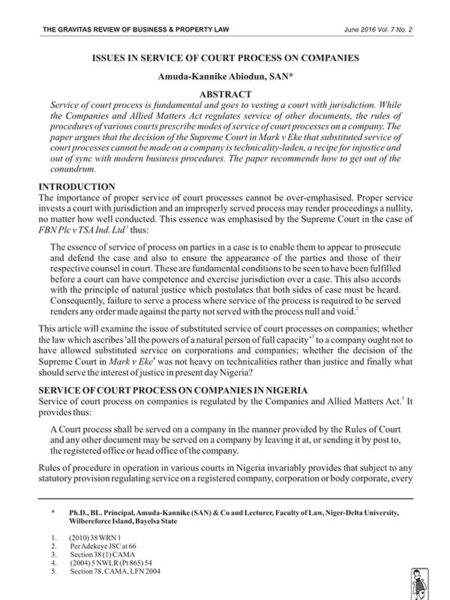
Issues in Service of Court Process on Companies
0₦2,500.00Dr Abiodun Amuda-Kannike SAN, Principal, Amuda-Kannike (SAN) & Co and Lecturer, Faculty of Law, Niger-Delta University, Wilberforce Island in his article, “Issues in Service of Court Process on Companies” examines the provision of the Companies and Allied Matters Act and various Rules of Court on service of court processes on companies. He bemoans the decision of the Supreme Court in Mark v Eke, that substituted service of court processes cannot be made on a company, as technicality-laden, a recipe for injustice and out of sync with modern business process.
-
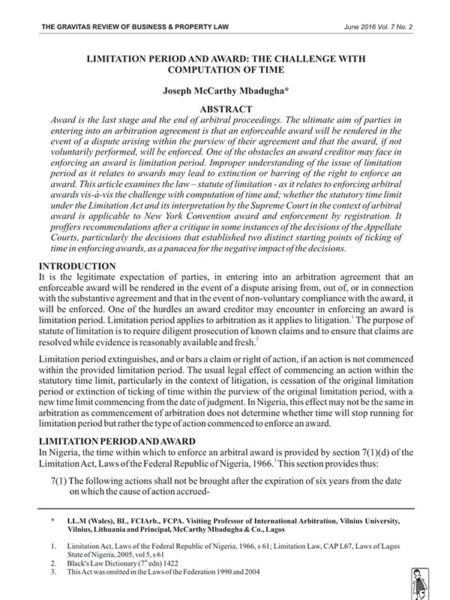
Limitation Period and Award: The Challenge with Computation of Time
0₦2,500.00Joseph Mbadugha, SAN, Visiting Professor of International Arbitration, Vilnius University, Lithuania and Principal, McCarthy Mbadugha & Co confronts a daunting issue in “Limitation Period and Award: The Challenge with Computation of Time.” He argues that as the courts have been strict in holding that, in enforcement of arbitral award, limitation period runs from the date of accrual of the original cause of action in the arbitration agreement and not from the date of the arbitral award, there could be two ways of enforcing an arbitral award with two distinct ticking clocks: enforcement of an award as a judgment of the court and enforcement as a breach of implied promise to perform a valid award. In the former, time begins to run from the date of accrual of the original cause of action that gave rise to the arbitration, while in the latter, time runs from the date the award debtor refused to perform the award.
-
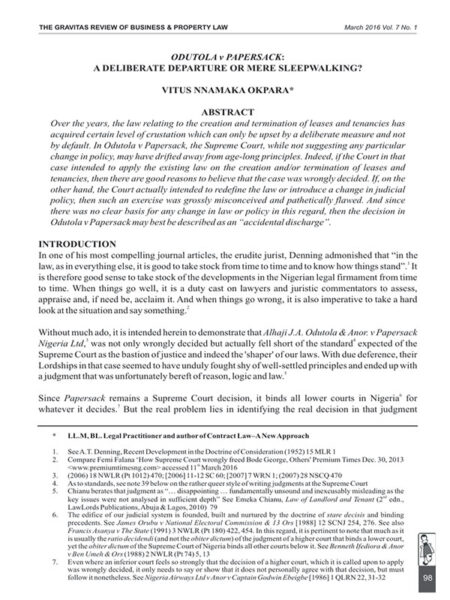
Odutola v Papersack: A Deliberate Departure or mere Sleepwalking?
0₦2,500.00Vitus Okpara, legal practitioner and author of Contract Law–A New Approach, continues the discussion on termination of tenancies in his article “Odutola v Papersack: A Deliberate Departure or Mere Sleepwalking?” In this compelling review, Okpara asks whether the Supreme Court intended to depart from a long line of its previous decisions on creation and termination of tenancies or the decision in Papersack was an “accidental discharge”.
-
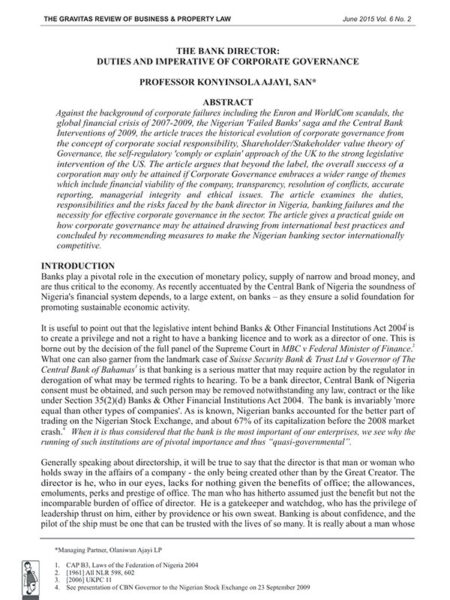
The Bank Director Duties and Imperative of Corporate Governance
0₦2,500.00Against the background of corporate failures in several countries, Professor Konyinsola Ajayi SAN, Managing Partner Olaniwun Ajayi LP, examines the duties and risks faced by the bank director in Nigeria and the necessity for effective corporate governance in the banking sector in “The Bank Director: Duties and Imperative of Corporate Governance”.
The Gravitas Review of Business & Property Law



